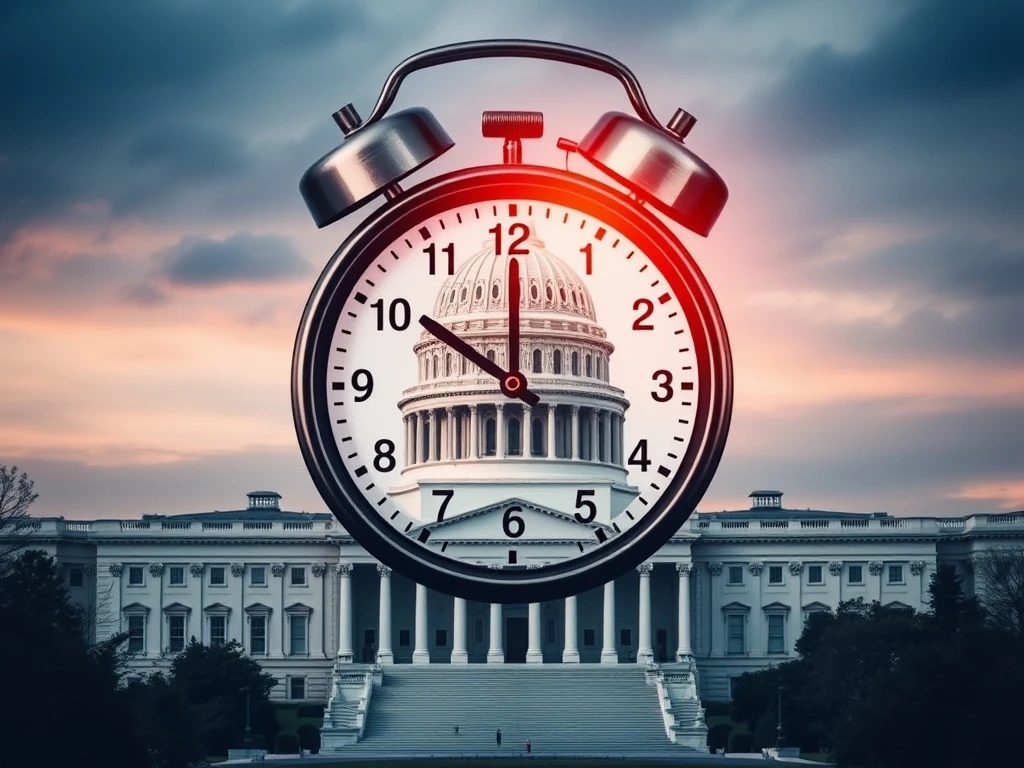Urgent Warning: US Crypto Bill Faces Perilous Deadline in Congress

The window for meaningful cryptocurrency legislation in the United States is rapidly closing. A prominent Republican senator has issued a stark warning: **US crypto bill** progress could soon halt. This critical period demands attention from everyone invested in the future of digital assets.
The Looming Deadline for US Crypto Bill Progress
Senator Thom Tillis, a Republican from North Carolina, recently voiced significant concerns. As a member of the US Senate Banking Committee, he understands the legislative calendar well. Tillis reportedly warned that Congress has only a few months left to advance any **crypto legislation**. Political dynamics, especially those tied to upcoming elections, threaten to derail current efforts. Specifically, the 2026 midterm elections are expected to complicate legislative progress. Lawmakers must act swiftly, according to Tillis. He suggested a deadline of “the first part of January, February” for any significant bills to pass. This timeframe is crucial for the current session, which concludes in January 2027. Consequently, the urgency for action is undeniable.
The Senator expressed pessimism regarding the immediate future. “I’m not optimistic about us moving much further on anything around **digital assets**, stablecoins, or crypto in this Congress,” Tillis stated, as reported by Bloomberg. This sentiment highlights the precarious position of crypto-related bills. A market structure framework, for instance, passed the House of Representatives in July. It currently awaits consideration in the Senate. However, its path forward remains uncertain.
Government Shutdowns and Stalled Crypto Legislation
Tillis’s remarks came amidst a US government shutdown. This shutdown began on October 1. Lawmakers failed to agree on a funding bill. Democratic concerns over healthcare cuts and subsidies caused the impasse. While the Senate continued its operations, House Speaker Mike Johnson delayed chamber business. This delay occurred even before the shutdown commenced. Therefore, legislative momentum has slowed considerably.
Several crypto-related bills found themselves stalled by these events. The CLARITY Act, passed by the House in July, was one such example. Senate leaders had previously indicated plans to “build on” this act. Their goal was to pass comprehensive market structure legislation. Senator Cynthia Lummis, another Republican leader on the Senate Banking Committee, had expressed optimism. Before the shutdown, she believed the Senate’s version, the Responsible Financial Innovation Act, would become law by 2026. However, these plans now face significant headwinds. The window for advancing crucial **crypto legislation** narrows with each passing day.
The Race to Regulate Digital Assets and Stablecoins
The push for clear **digital assets** regulation continues. Industry participants and innovators eagerly await clear guidelines. These regulations are vital for fostering innovation and ensuring consumer protection. Without a comprehensive framework, the US risks falling behind other nations. Many countries are already establishing clearer rules for the crypto space. The lack of a defined legal and regulatory environment creates uncertainty. This uncertainty can deter investment and slow technological advancement within the country.
Furthermore, the regulation of **stablecoins** is a key area of focus. Stablecoins are crucial for the broader crypto ecosystem. They facilitate transactions and provide stability. Proper oversight can ensure their integrity and prevent systemic risks. Both the House and Senate have considered various approaches to stablecoin regulation. However, consensus remains elusive. The current political climate only exacerbates these challenges. Lawmakers must find common ground soon. Otherwise, opportunities for robust, clear, and fair stablecoin frameworks may vanish. This critical period calls for decisive action.
Key Appointments and the Future of US Crypto Policy
Leadership in regulatory bodies also plays a significant role. On Saturday, Securities and Exchange Commission official Michael Selig made an announcement. He confirmed US President Donald Trump had nominated him to chair the Commodity Futures Trading Commission (CFTC). The CFTC is one of the key financial regulators. It significantly impacts how crypto companies operate in the country. Selig’s confirmation hearing had not appeared on the Senate calendar as of Monday. His appointment, if confirmed, could shape the regulatory landscape for years. The CFTC’s stance on various **digital assets** and derivatives is highly influential. Therefore, this nomination holds considerable weight for the industry.
The interplay between legislative efforts and regulatory appointments is complex. Congressional action sets the broad framework. Regulatory bodies then interpret and enforce these laws. Without clear guidance from **Congress**, regulators face challenges. They must navigate a rapidly evolving sector with existing, often outdated, rules. This situation creates a fragmented and sometimes contradictory regulatory environment. Consequently, a unified approach is essential. The opportunity for a cohesive strategy diminishes as time runs out. Stakeholders across the crypto industry are closely watching these developments. They understand the profound implications for their future operations. The coming months will prove decisive for the future of crypto in the US.







